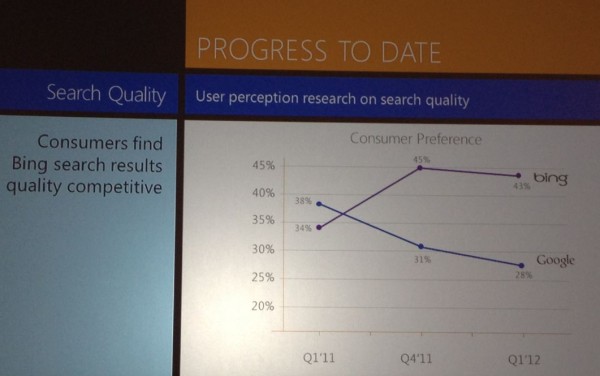Bing announced a relaunch of its search engine today, with a big emphasis on bringing social into search. But wait! Didn’t Bing already have social as part of its search experience? Yes, but now the search engine hopes to do it better, especially by largely off-loading social elements into a new sidebar area. The new […]
Bing announced a relaunch of its search engine today, with a big emphasis on bringing social into search. But wait! Didn’t Bing already have social as part of its search experience? Yes, but now the search engine hopes to do it better, especially by largely off-loading social elements into a new sidebar area.
The new features will appear for Bing users in the United States the coming days, taking several weeks to go live fully for everyone.
Postscript: The new Bing should now be live for everyone. If you don’t have it, see the instructions here: Bing’s New Social-Friendly Search Interface Now Live.
The New Bing
What’s in “The New Bing,” as the Microsoft post pitches it as? A three column design with Core Search, Snapshot & Sidebar panes
- Core Search loses many of the social annotations that Bing has added over the years
- Snapshot provides additional information about a particular search listing, without having to leave Bing
- Sidebar serves as a new home for social integration with search
Bing’s put together a short video explaining the new features, which you can watch below. After that, I’ll take you on my own personal tour of the changes
Let’s take a closer look at the changes.
The Social Sidebar
I’ll start with the new social sidebar, as it’s the most dramatic of the changes:
 100vw, 600px” data-lazy-src=”https://searchengineland.com/wp-content/seloads/2012/05/social-sidebar-600×319.png” /></a></p>
<p>In the sidebar, various social elements may appear depending on how relevant Bing decides they are to your search. In the case above, I did a search for Costa Rica, which triggered three of the four main elements you’ll see:</p>
<ul>
<li>Ask Friends</li>
<li>Friends Who Might Know</li>
<li>People Who Know</li>
<li>Activity Feed</li>
</ul>
<p>Let’s drill-down further into these areas.</p>
<h2>Friends Who Might Know</h2>
<p>In the “Friends Who Might Know” area, if you’re signed-in to Bing, people you know on Facebook who may have knowledge about what you’re searching for are suggested:</p>
<p><img class=) “Ask On Google+” Links Appearing In Google’s Search Results explains more about that. I felt it was an intrusion on Google+. On Bing, the same feature tucked to the side seems welcome.
“Ask On Google+” Links Appearing In Google’s Search Results explains more about that. I felt it was an intrusion on Google+. On Bing, the same feature tucked to the side seems welcome.
People Who Know
So far, all the social features I’ve covered have been Facebook-specific. You can ask friends for advice, but only your Facebook friends. What about friends on other social networks? Or what about finding people who aren’t friends but who still might be useful sources of information in other ways.
Consider a search for Google on Bing. That provides a variety of people showing up in the People Who Know area, including the head of Google’s web spam team, Matt Cutts. I’ve hovered over him to bring up his profile:
 100vw, 542px” data-lazy-src=”https://searchengineland.com/wp-content/seloads/2012/05/matt-on-bing.png” /></p>
<p>Cutts is showing up because Bing, looking through the Twitter access is has access to, considers him relevant to a search on Google. Indeed, he is. This also illustrates how well “People Who Know” gets Bing out of a possible Facebook trap. <a href=) Cutts closed his Facebook account in 2010. If Bing only looked at Facebook, he wouldn’t come up as a suggestion.
Cutts closed his Facebook account in 2010. If Bing only looked at Facebook, he wouldn’t come up as a suggestion.
It’s not just Facebook and Twitter that get to play in the social sidebar, however. Social suggestions might also come from LinkedIn, Quora, Foursquare, Blogger and — wait for it — Google Plus:
 100vw, 521px” data-lazy-src=”https://searchengineland.com/wp-content/seloads/2012/05/vic-on-bing.png” /></p>
<p>That’s Vic Gundotra, the Google executive in charge of Google+ and Google’s social efforts. He’s showing up because Bing believes his Google+ page is relevant to those searching on Google.</p>
<p>How’s Bing getting Google+ information? Simple. These are public pages that it crawls already. Bing told me:</p>
<blockquote><p>To get the content for the “People Who Know” section we mine public blogs, tweets, and Google+ posts to find information relative to the topic of interest.</p></blockquote>
<p>Bing also clarified that the suggests in People Who Know should be the same for everyone. They aren’t personalized to a particular person, as is the case with Friends Who Know.</p>
<h2>Bing’s Doing What Google Doesn’t?</h2>
<p>Some might recall a dispute that emerged after Google revamped its own search meets social effort, <a href=) Search Plus Your World, which launched in January. To recap:
Search Plus Your World, which launched in January. To recap:
- Google added a new People & Pages box that offered suggestions of accounts to follow, but only accounts from Google Plus.
- After complaints of favoritism, Google argued that it couldn’t get the information it needed from the other social networks, due to deliberate blocking.
- Twitter and Facebook whipped up a “Don’t Be Evil” toolbar using data from the open web to disprove this.
Now Bing is also using open web data to seemingly have more suggestions from a variety of social networks that Google does. It’s even including Google! Expect that to be used as a point against Google.
However, Google still has an argument that it cannot get all the same data on the open web as Bing. Twitter actually closed itself off to Google last year, blocking Google from even getting open web data. Even if Google renews a deal with Twitter, it’s now gunshy about building features around something that might disappear. Meanwhile, Facebook doesn’t seem to allow public posts out to the open web.
Bing doesn’t have these issues, with a deal in place with Twitter and Facebook and no apparent blocking by Google. I actually hope that Google and Twitter get past their impasse; I’d like to see Facebook fully open up, as well. My previous thoughts on all this are here: A Proposal For Social Network Détente.
Activity
The final element of the sidebar is the Activity area. This is a running feed of questions you’ve asked or those asked by those you know, through Bing’s connection with Facebook:
 100vw, 542px” data-lazy-src=”https://searchengineland.com/wp-content/seloads/2012/05/activity-feed1.png” /></p>
<p>In the example above, you can see how Derrick Connell, the corporate VP over Bing, was asking a question out to his Facebook friends. Since I’m one of them, I saw his question appear in my Activity feed. Clicking on it allowed me to respond; hovering over it shows me all the responses to his question.</p>
<p>Hovering over my own questions also lets me see responses I might have received:</p>
<p><img class=) Bing’s first big social push in October 2010 included things like this:
Bing’s first big social push in October 2010 included things like this:
 100vw, 500px” data-lazy-src=”https://searchengineland.com/wp-content/seloads/2010/10/bing-gap-logo-500×146.png” /></p>
<p>or this:</p>
<p><img class=) suggestions that social annotations help, or at least that they help clickthrough rate. It’s one reason Google provides tools for publishers to measure this for themselves.
suggestions that social annotations help, or at least that they help clickthrough rate. It’s one reason Google provides tools for publishers to measure this for themselves.
Expect more debate and examination to follow. But I have to say, losing that stuff does help give Bing an even cleaner look that what it already tidied up last week in preparation for today’s relaunch.
As I said, social is still there. Consider these search results:
 100vw, 571px” data-lazy-src=”https://searchengineland.com/wp-content/seloads/2012/05/social-subtle1.png” /><br />
Trending Arrow & Friend Thumbs-Up</h2>
<p>The first example shows a little gray arrow pointing upward. The red arrow I’ve added, to point to what happens if you hover over the gray arrow. It causes it to be surrounded by a blue circle, with a little box showing up that says that particular search results it trending on Twitter and Facebook. This trending arrow may also appear next to items that are doing well on either Twitter or Facebook, rather than both.</p>
<p>The second example has a thumbs-up icon. Hover over that, and it’s surrounded by a blue circle, with a box providing more information. In this case, I’m shown that four of my friends like the site the article is from. If I hover over any of the friend icons, I can see their actual names — though if there are more than three, I can’t see the full list. I’m also told that in addition, the item is trending on Twitter.</p>
<p>In summary:</p>
<ul>
<li><strong>Thumbs-Up </strong>= Results has social activity from your friends</li>
<li><strong>Trending Arrow</strong> = Result has social activity not from your friends by a wide number of people in general</li>
</ul>
<p>In the annotation boxes, you’ll sometimes see that a site name appears. For example, look at these two results for a search on Obama:</p>
<p><img class=) Bing began personalizing its search results last year, and that still continues, with your location and your past search history being key signals. But social also plays a role.
Bing began personalizing its search results last year, and that still continues, with your location and your past search history being key signals. But social also plays a role.
Things that are trending on Twitter or Facebook in aggregate might rank higher for a short period of time, Bing told me.
In addition, in testing, I can see that things that are liked by me or by my friends might come higher in the results, if I’m signed-in. This is similar to how Google’s Search Plus Your World works.
Snapshot
When Bing initially launched three years ago with the “Decision Engine” tagline, it was also billed as something that would help people accomplish task. But for the most part, it never really seemed to deliver on that promise in any unique way.
Snapshot, new information that appears in the center column, goes further toward delivering on tasks:
 100vw, 600px” data-lazy-src=”https://searchengineland.com/wp-content/seloads/2012/05/snapshot-600×489.png” /></p>
<p>Above, you can see an example of Snapshot. It appears for the “Ray’s Boathouse” listing. If you were to hover over that, reviews, a map to the restaurant and the ability to book reservations through Open Table would appear to the right, in the center column.</p>
<p>I saw a few other examples last month in an early preview of the new Bing, and I found the implementations pretty impressive. They draw information also from Yelp, FanSnap and other partners.</p>
<p>Unfortunately, Snapshot didn’t seem to be working as I wrote this review, so I can’t explore it more. We’ll have a separate article just on Snapshot in the near future, and we’ll link over from here to that, when it’s ready.</p>
<h2>Have You Tried Bing Recently?</h2>
<p>Bing’s relaunch comes at a good time. Google’s own effective relaunch, <a href=) Search Plus Your World last January, put off some tech commentators who felt it shoved too much personal information and too much Google+ification into the listings.
Search Plus Your World last January, put off some tech commentators who felt it shoved too much personal information and too much Google+ification into the listings.
Now comes Bing, with a clean design that looks like the Google of old, with social shoved off to the side where it’s around if you want it but not in your face. On the surface, it seems pleasing.
Add to that the fact that Bing’s search results themselves are good. Indeed, Bing’s blog post is touting that in its own testing, when people are shown search results without the Google or Bing brand attached to them, Bing is winning:
We regularly test unbranded results, removing any trace of Google and Bing branding. When we did this study in January of last year 34% people preferred Bing, while 38% preferred Google.
The same unbranded study now shows that Bing Search results now have a much wider lead over Google’s. When shown unbranded search results 43% prefer Bing results while only 28% prefer Google results.
What this means is that in 3 years we’ve made some real progress in core relevance and search quality, and while search is becoming so much more than just web results, having a rock solid foundation is important for the future of Bing and search more generally.
Here’s a chart of of today’s Bing Search Summit with the trend:

This is Bing’s own testing, of course. I’ve got no doubt Google has its own testing that shows Google beats Bing. Google has also argued that ordinary searchers do like Search Plus Your World. Certainly there’s been no mass abandonment of Google. It’s fair to say the vast majority of its searchers remain happy with the search engine.
It’s also important to note that in real life, the personalization Google does may indeed work better than Bing. I’ve got a lot more testing to do, and results will vary based on each person’s own social connections. But see my sidebar article for more: Head-To-Head: Bing’s Social Search Vs. Google’s Search Plus Your World.
Still, I I’ve been spending a lot more time on Bing over the past week or so, as I’ve tried to assess if Google’s recent Penguin Update made Google’s results better or worse. There’s no way I or anyone can tell with a few searches if that’s the case.
What I do know is that Bing’s results do feel comparable to Google. I even spent the past day using them exclusively instead of Google. I didn’t struggle. I didn’t feel I couldn’t find stuff. A part of me kept feeling like I should run back “home” to Google, but the more I used Bing, the less that became.
I’d say that Bing is even more competitive with Google than ever before. It’s definitely worth another look by anyone, and the competition between the two benefits everyone.
Other outlets are covering today’s Bing news. Techmeme has a round-up here. CNET has some nice background on Facebook’s Mark Zuckerberg giving input into the changes. The New York Times has some good perspective on how Bing’s changes fit in with the challenges against Google.




